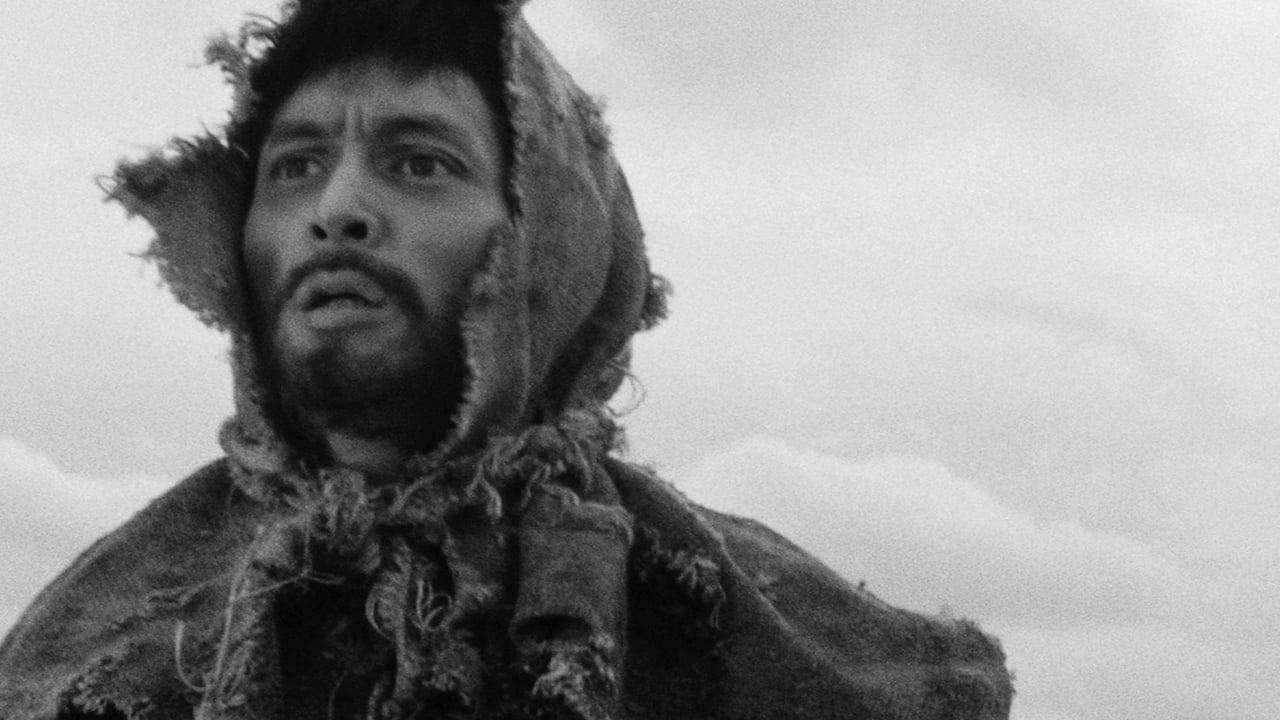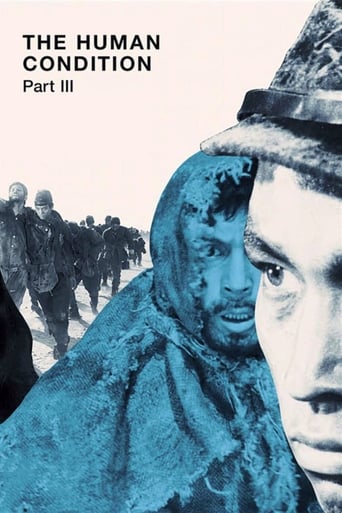

The third and final part of "The Human Condition" series is the most brutal, breathtaking and deeply disturbing movie of the three. All the beating you saw in the second part cant even come close to how physically, but especially psychologically brutal and disturbing this movie can be. This movie ultimatly playes with the idea that no matter how much of a good person you are, which in the case of our main protagonist, Kaji was shown throughout the last 2 movies, you will always been judged by steriotypes and clichee rather than on your actions and what you have been going through. Is it right to torture and treat people the same way they treated others, even if they have been forced by the military and the zeitgeist of the moment? Is it morally justifiable? This is something everyone has to answer for themself, this movie just shows you this idea in an objective manner not really taking any sides.With watching this series Masaki Kobayashi, finally made the case for him being the best japanese director of the last century in my opinion. And it also made the case for Tatsuya Nakadai being the best actor of the last century. The emotions this man can convey with this performance by far surpass anything I have seen from any other japanese actor of the last century. The character development Kaji endured throughout the series but especially through this final part was written perfectly and absolutely believably portrayed.
... View MoreThe Human Condition (Ningen no jôken) is a 9,5 hour long epic film trilogy directed by Masaki Kobayashi, based on the six volume novel by Junpei Gomikawa. The trilogy stays true to the novel's composition by being divided into six parts, meaning that each of the three installments are split in two parts, in between which are intermissions. Both parts in the first film begin with the same opening credits sequence, showing us some stoneworks portraying dramatic imagery (the similar intro opens all three films). The three movies, each long 3 hours or more, are called No Greater Love, Road to Eternity and A Soldier's Prayer.Okay, now, I enjoyed the first film despite some historical inaccuracies. I liked the second movie but it didn't leave much of an impact on me. But this one, A Soldier's Prayer, is just brilliant.Unlike the first two films, ASP is much less repetitive and a lot more diverse stuff goes on. We follow Kaji on his long path to his wife Michiko. First he tries to flee the war zone accompanied by other soldiers and civilians, then they encounter Chinese forces, from which they escape through a burning wheat field. They stumble upon an encampment which gets besieged by the Soviets, after which Kaji ends up as a worker in a Red Army camp, mirroring his position in a Manchurian work camp from the first film. He escapes and meets his doom in a snowy outback, where he dies out of hunger or exhaustion.That's basically the plot, although a lot of other things happen and a lot of characters are introduced. Throughout the film, you feel 100% immersed in every obstacle Kaji faces and that feeling never lets up. Tatsuya Nakadai gives us one of the best, most believable performances I've ever come across (and I don't even think this is his best). Kobayashi: "When I made The Human Condition, most actors at that time were either of prewar or mid-war generations. I was looking for a person who could convey the feeling of the new generation. Nakadai was able to convey this new, strong, energetic side of postwar youth."Of course the supporting cast is great too, and there are even some big names accompanying the unknown portion of the cast. There's Kyoko Kishida as Ryuko, Chishu Ryu as the man in the encampment and Hideko Takamine as the unnamed woman who's also situated there.The cinematography is even better than in its two predecessors; some shots from this movie you'll remember for a long, long time - Kaji standing by a huge field with scavengers flying around, him being interrogated at the Soviet work camp HQ and finally getting stranded in the middle of nowhere for example. It's interesting to note that the first two films begin with a snowy scene, while the third movie ends with one.The trilogy doesn't take any sides as far as nations themselves are concerned and even portrays the Japanese military in an unbelievably negative light for the time it was released. It's an universal anti-war film that brilliantly concludes the trilogy. Kobayashi also argued against the militaristic system while he was in the army, which must be why he later said: "I am Kaji."Kobayashi: "I spent four years making The Human Condition. While making it, I received many letters from people requesting me not to let Kaji die in the end. I had considered that possibility, but to me, his death was actually a resurrection. He had to die there. With his death, he lives in the minds of people for a long time, as a symbol of the hope that we can eradicate the human tragedy of war."Kaji's beliefs are often challenged and inverted throughout the trilogy. According to the director, he said he wanted to portray the tragic dual nature that the Japanese people experienced back then.
... View MoreThis trilogy was a grueling and rewarding. It was chilling to watch but I persevered. It was about the conflict between nationalism and the individual struggling for humanism. If you transfer yourself to post WW2 Japan you could see how powerful this film was. It was necessary for the soul searching that was to heal the results of the war.It is as important today as it was then.This trilogy affected me deeply after watching it.There is hardly a frame in the ten hours that does not have any sub-text associated with it.The ten hour film format has some merits maybe it will catch on.
... View MoreNingen no jôken is a masterpiece film but is also painful to watch most of the time. Nonetheless, it is a tour de force to be lauded for its direction, cinematography and acting at every turn. Most of those commenting in previous discussions mention the virulent anti-war sentiment of the film which is abundantly evident. It was interesting that much of the film is autobiographical, inspired by Kobayashi's war experiences. He too refused to be an officer when he qualified, and stayed a private throughout the war. An interesting point came up when I was watching the fourth DVD in the Criterion edition of The HumanCondition which is a series of three insightful interviews. During his comments the director Masahiro Shinoda mentioned that he thought at the time, the romantic love Kaji had for his wife, Michiko, was overly sentimental and unrealistic. He thought that it was due to the fact that Kobayashi and his peers were born of another age whose romanticism was the norm and unsullied by his generation's sobering war experience. He said that he had also consulted the internet to see the opinions of the film among contemporary young people in Japan today, and found that they too, thought the love unrealistic. He felt the love should have been more erotic and less idealized. The remarks of another commentator solidified my opinion of this issue about Kaji's love. That writer stated that the title really means more like "condition for being human." This confirmed my opinion that Kobayashi's point of the film is that what makes one human, in the best sense of the word, is love. Otherwise we devolve into some type of cruel bestiality found in the phrase 'man's inhumanity to man.' This inhumanity is evident throughout the film, whether in the sadism of the other Japanese soldiers, the cruelty of the guards to the Chinese prisoners, or in the malice of the of the Russian overseers. However, the Kaji character is set apart: he sticks to his ideals, he is humble, he displays selflessness as seen when he gives his food to another or when leading the men and puts them ahead of himself. He is a type of everyman whose being is elevated above merely satisfying physical needs and responding to base instincts. He remains an ennobled human not a saint above the fray, but his love gives him the will to live, to continue on and to even do good when surrounded by evil. Love is the condition for being human.
... View More